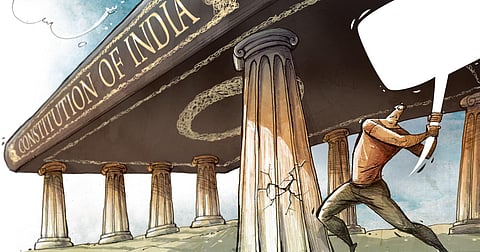

India's Constitution was formally adopted 73 years ago on this day i.e. the 26th of November 1949. The adoption of the Indian Constitution by the Constituent Assembly was not an ordinary moment in world history, let alone in India's socio-political history.
India adopted the world's longest-written constitution, propounding at its core, basic principles of democracy and equality. It was supposed to be, as Granville Austin would later put it, 'a modernizing force and a social revolutionary document whose ideals were national unity and integrity and a democratic and equitable society'.
The Indian Constitution, in that sense, was truly ahead of its time.
On the one hand, it laid down the path to social and political emancipation by providing for a representative government on the basis of Universal Adult Franchise, Minority Rights, Religious Freedom, Equality before law, compensatory discrimination and protection against state excess. On the other, it also provided for a structural framework of a nation state in the provisions relating to separation of powers, centralised federalism, independent judiciary, Election Commission etc.
ALSO READ | The future of the Indian Constitution
Remember that our Constitution was adopted at a time in world history when there was little evidence to suggest that democracy was indeed the right tool to eradicate mass poverty, remove widespread illiteracy or even ensure efficient governance.
After all, the second World War had just ended and one amongst its many learnings was that democracies, if anything, could also very well give birth to dictatorship. In fact, many developed countries had gone to the extent of warning India against choosing democracy and, in all fairness, their skepticism was based on well-founded reasons.
This skepticism existed across the board and wasn't just limited to the constitution's turn to democracy but spread to its other provisions too. Many believed that India wasn't ready for a progressive, liberal and futuristic constitution. Those who came from this school of thought believed that for such a constitution to work, a country must first establish certain essential prerequisites and that India's ground realities were completely different.
Therefore, for a nation that had just been born after decades of struggle for freedom from colonial rule, and which was also deeply divided, illiterate and extremely poor, was this a foolhardy misadventure?
With the benefit of hindsight, one can certainly conclude that this wasn't the case. The Indian Constitution had set out on the journey to foster the achievement of many goals and in the last seven decades of its continued existence, it has survived the test of time. Its ability to transform itself and be flexible to the needs of our times makes it a truly living document. Furthermore, it impacts the lives of every single citizen of this country on a daily basis and makes them the centre of its existence.
However, the Constitution doesn't just matter because it betters the lives of citizens by granting them essential rights and liberties by way of a bill of rights or because it designs the governance structure of our country. Our argument, through this piece, is that the Constitution matters for at least three larger and even more important reasons.
First, the Constitution is a living memory of the freedom struggle. The rights granted or the stipulations provided within the bare text of the document are a culmination of a long struggle for Independence. It reminds us of our troubled history, of despotism during colonial rule, lack of accountability of institutions and those who manned them and, above all, the absence of Rule of Law. The Constitution reminds us of a past we don't want to go back to.
Second, the Constitution matters because it also reminds us of those national heroes who contributed not just to the process of Constitution making but, in a way, also to India's Constitutionalism and its ever-surviving democracy. It reminds us of those others who, despite not being a part of the Constitution-making process, fought during the freedom struggle and sacrificed their lives for it. Those millions of other Indians, who dreamt of a free nation but were not able to live in an Independent India. The constitution is a living memory of our martyrs who went beyond their self-interests to build a country, a motherland of their dreams.
Finally, the Constitution matters because it reminds us of the inclusivity and the principles of deliberative democracy that characterised the entire Constitution-making process. It reminds us of the discourse and the debates that helped the document take its final shape. It also reminds us that the Constitution wasn't a result of the will of a few but instead it came from the wishes of many -- that a truly egalitarian text could not have been framed without the process itself being democratic.
The Constituent Assembly was, as Granville Austin has again put it, 'India in Microcosm'. The Assembly represented all sections of society and was a safe space for opposition and meaningful criticism. No one in the assembly arrogated to themselves the power and authority to be wiser than others.
This Constitution Day, let us, therefore, remind ourselves that the Constitution making was an act of vision, an act of idealism and faith and an act equally of trust in future generations who would inherit it. Let the document, therefore, act as a source of inspiration for many more generations to come.
This Constitution Day, let us also look back at our history and ponder how far we've truly come. Let's pledge to build a country based on Constitutional Ethos and transform a billion dreams. Let's pledge to eradicate mass poverty and human sufferings. Let's also finally pledge to once again initiate a social revolution to build a country that is closer to the dreams of our founders.
Anurag is a Delhi-based lawyer and Bhavya is UN Millenium Fellow 2022.